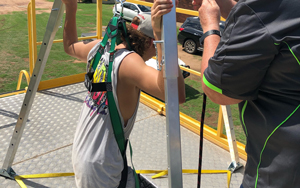Opportunities for jobs and business
Federal Budget - Opportunities aplenty for local jobs and business

What the Budget means for locals wanting to train or businesses who want to fill those jobs.
Glued to the budget last night I was heartened to see an extension of funding into the next financial year for programs that are already rolling out through the college. The budget has delivered well as long as locals take up the opportunities and half the battle is in understanding what this means. This is:- JobTrainer: An additional $506.3M will be made available to extend the JobTrainer program over two years – in NSW this is called Skilling for Recovery funding and many training places are on offer now.
- Apprenticeships: A commitment of $2.7B over four years for the Boosting Apprenticeships Commencements initiative. This is funding to assist local businesses to employ trainees or apprentices. The college has found that employers are confused by this but essentially it is a great opportunity to give training or new employment to people who can move from part-time or casual into more secure work which will help solve skilled worker issues. Under-employment is a huge issue here but for an employer this will give a financial boost to make that transition in the workforce.
- Women In Non-Traditional Trades: There are 5,000 additional gateway places to support women commencing in non-traditional trades. This will allow targeted training for selected trades to be funded with extra incentives for employers and trainees.
- Skills Reform: A five-year $285M commitment to establish the successor to the Skills Service Organisations, improve data collection and analysis, and a to deliver a project on work placements. The college is as we speak, delivering a teaching and leadership project on this very issue throughout NSW as a leading provider of aged care, disability and community services qualifications. This initiative is welcomed by the college as work-placement is essential to build the soft skills required in these jobs for quality care.
- Foundation Skills: A four-year commitment of $23.6M to support foundation skills and accelerate the inclusion of digital skills for job seekers. The college is already delivering Digital Skills centres in all of our Campuses one day per week fee free and we are very excited to see how this develops.
- Aged Care: To grow and upskill the aged care workforce, $216.7M has been promised to meet recommendations arising from the Royal Commission Into the Quality and Safety of Aged Care, including through additional nursing scholarships and places. Again, I am so excited to finally see some support for this essential service and to support the work of the quality providers that we have in the NENW area.
- Digital Skills: Over three years $10.7M has been provided to trial four industry-lead Digital Skills Cadetships. As a large organisation I am so relieved that we may get suitably trained IT workers to assist us on our digital transformation and to ensure Cyber Security.
- National Careers Institute: To facilitate career pathways for women there is a $12.2 million commitment through the National Careers Institute. Most of the college workforce of over 60 workers is female and creating career pathways is going to help with the skills shortage as we grow.
So today, Community College campuses across the Northern Inland are offering a range of fee-free training under the NSW Government’s Skilling for Recovery initiative to help eligible job seekers retrain or up-skill to enhance their credentials and support school leavers to enter the workforce for the first time.
Skilling for Recovery is part of a matched funding commitment of almost $320 million between the NSW and Australian governments under the JobTrainer Fund. The program is a key component of the State’s COVID-19 Recovery Plan.
As a NSW Government Smart and Skilled training provider, Community College Northern Inland can help eligible students obtain Skilling for Recovery funded training. Executive Officer, Alison Heagney is encouraging people throughout the region to contact the college to find out what funded training options are available to them.
“The Skilling for Recovery initiative is allowing us to deliver more opportunities for rural and regional people to take part in fully-funded, local training that will increase their chances of getting first-time employment or help them upskill to meet changing job requirements. The college has a track record delivering face-to-face training to students that experience barriers to training and employment and this much-needed initiative allows us to expand our training program and to reach a greater number of eligible students.”
“Training is taking place in campuses with courses also set down in outreach locations. Students will benefit from local trainers who are well connected with industry locally and a local training organisation that is able to understand the challenges students face in preparing for current and future work opportunities in our region.”
The college has already commenced its Skilling for Recovery program with fee-free nationally accredited short courses including CPR, First Aid and First Aid for Childcare, Confined Spaces, Forklift, White Card and Working at Heights. Courses will run at campuses in Barraba, Bingara, Gunnedah, Inverell, Moree, Narrabri and Warialda, with some training offered at outreach locations including Ashford, Boggabri, Bundarra, Delungra, Gravesend, North Star, Pilliga, Wee Waa and Yetman. Other courses and skill sets will be added throughout the term at select locations.
Alison Heagney, Executive Officer - Community College Northern Inland
Photograph: High Risk trainer Belinda Radford (at right) takes students through the practical component of their Working at Heights training at the Bingara Campus.
